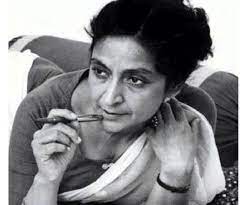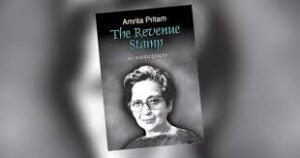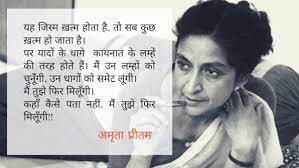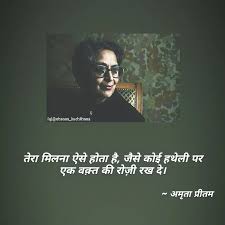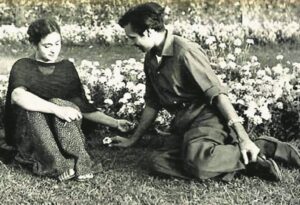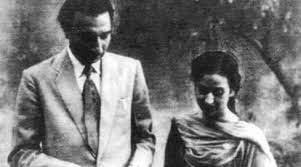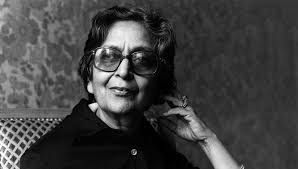Amrita Pritam –
Amrita Pritam was a renowned Indian writer and poet, celebrated for her literary contributions in Punjabi and Hindi literature. Here’s an overview of her biography:
Amrita Pritam’s Early Life:
Amrita Pritam, born Amrita Kaur, was a renowned Indian writer and poet, celebrated for her contributions to Punjabi literature. Here are some details about her early life:
1. Birth: Amrita Pritam was born on August 31, 1919, in Gujranwala, which was then part of British India and is now in present-day Pakistan.
2. Family Background: She was born into a Sikh family. Her father, Kartar Singh Hitkari, was a schoolteacher and a poet, which perhaps instilled in her an early love for literature.
3. Education: Pritam received her early education at the Khalsa College for Women in Lahore. She showed a keen interest in poetry and literature from a young age.
4. Marriage and Early Writing Career: At the age of 16, Amrita Pritam married Pritam Singh, an editor of a Punjabi literary magazine. This marked the beginning of her association with the world of literature. Her early poetry was published under the pen name Amrita Pritam.
5. Early Works: Pritam’s early works reflected the social and cultural milieu of her time. She wrote about the experiences of women, the partition of India in 1947, and the human condition with depth and sensitivity.
6. Recognition: Her talent was recognized early on, and she became one of the leading literary figures of her generation. She received numerous awards and honors throughout her career, including the Sahitya Akademi Award in 1956 for her long poem “Sunehade” (Messages).
7. Activism: Apart from her literary pursuits, Amrita Pritam was also known for her activism. She was deeply involved in social and political causes, advocating for the rights of women and marginalized communities.
Amrita Pritam’s early life laid the foundation for her prolific literary career, which spanned several decades and left an indelible mark on Indian literature. Her works continue to inspire readers and writers alike with their timeless relevance and universal themes.
Amrita Pritam’s Literary Career:
Amrita Pritam began writing at a young age and gained recognition for her poetry during her teenage years. Her early works reflected themes of romanticism and rebellion against societal norms. She wrote extensively in Punjabi and later translated many of her works into Hindi and other languages.
Her most famous work is the Punjabi poem collection titled “Sunehade” (Messages), which was published in 1949. This collection earned her widespread acclaim and established her as a prominent voice in Punjabi literature.
Amrita Pritam’s literary career spanned several decades and encompassed various forms of writing, including poetry, fiction, essays, and autobiographical works. Here are some details about her literary career:
1. Poetry:
Amrita Pritam is perhaps best known for her poetry, which she began writing at a young age. Her poetry reflects a deep sensitivity to human emotions, especially the experiences of women, love, and the socio-political realities of her time. Her poetic style is characterized by simplicity, sincerity, and emotional depth. Some of her notable poetry collections include “Ajj Aakhaan Waris Shah Nu” (Today I Invoke Waris Shah), “Kagaz Te Canvas” (Paper and Canvas), and “Naginaa Da Ishaq” (The Love of the Gem).
Amrita Pritam penned numerous poems throughout her prolific career, many of which have become celebrated for their emotional depth, social commentary, and lyrical beauty. Here are some of her most famous poems:
1. Ajj Aakhaan Waris Shah Nu (Today I Invoke Waris Shah): This poem, written in the aftermath of the partition of India in 1947, is perhaps one of Amrita Pritam’s most renowned works. It addresses the Sufi poet Waris Shah, imploring him to rise from his grave and witness the devastation caused by the partition. It captures the anguish, pain, and longing for peace in the aftermath of communal violence.
2. Main Tenu Phir Milangi (I Will Meet You Again): This poem is a poignant expression of love and longing. It reflects on the enduring nature of love and the belief that despite physical separation, souls remain connected. It’s often considered one of Pritam’s most powerful and evocative love poems.
3. Aj Di Raat (Tonight): In this poem, Amrita Pritam explores themes of loneliness, existentialism, and the passage of time. The poem’s speaker reflects on the solitude of the night and contemplates the mysteries of life and death.
4. Kagaz Te Canvas (Paper and Canvas): This collection of poems delves into various facets of life, love, and creativity. Pritam’s verses in this collection are characterized by their simplicity, yet they carry profound philosophical insights and reflections on the human experience.
5. Naginaa Da Ishaq (The Love of the Gem): In this poem, Pritam employs imagery of precious gems to symbolize love and longing. The poem explores the depth of human emotions and the transformative power of love.
These are just a few examples of Amrita Pritam’s famous poetry. Her body of work is vast and diverse, encompassing a wide range of themes and emotions. Pritam’s poetry continues to resonate with readers for its timeless relevance and universal appeal.
2. Fiction: Alongside her poetry, Pritam also wrote fiction, including novels and short stories. Her fictional works often explore the complexities of human relationships, societal norms, and the struggles of women in patriarchal societies. One of her most famous novels is “Pinjar” (The Skeleton), which portrays the trauma and upheaval caused by the partition of India in 1947.
3. Autobiographical Works: Pritam wrote several autobiographical works, offering insights into her own life and experiences. “Rasidi Ticket” (Revenue Stamp) is one such notable autobiography where she candidly reflects on her life, love, and literary journey. Her autobiographical writings provide a glimpse into the cultural and historical context of her time.
4. Essays and Journalism: Pritam was also an accomplished essayist and journalist. She wrote extensively on various social, cultural, and political issues, advocating for gender equality, social justice, and peace. Her essays are marked by their intellectual rigor, clarity of thought, and commitment to progressive ideals.
5. Recognition and Awards: Amrita Pritam received numerous awards and honors for her literary contributions. She was the first woman to receive the Sahitya Akademi Award in 1956 for her long poem “Sunehade” (Messages). She was also honored with the Padma Vibhushan, one of India’s highest civilian awards, in 2004, in recognition of her outstanding contribution to literature and social activism.
Amrita Pritam’s literary legacy continues to inspire readers and writers around the world. Her works remain relevant for their exploration of universal themes and their profound insights into the human condition.
Amrita Pritam’s love story-
Amrita Pritam’s writing often explored themes such as love, loss, feminism, and the partition of India in 1947.She witnessed the horrors of the partition firsthand, an experience that deeply influenced her work. Her poignant prose and poetry captured the human suffering and emotional turmoil caused by the partition.
Amrita Pritam’s Notable Works:
Some of Amrita Pritam’s notable works include:
– “Pinjar” (The Skeleton) – A novel that depicts the impact of partition on individuals and families.
– “Rasidi Ticket” (Revenue Stamp) – An autobiographical novel that delves into her personal life and relationships.
– “Ajj Aakhaan Waris Shah Nu” (Today I Invoke Waris Shah) – A poem lamenting the tragedies of partition and calling out to the 18th-century Punjabi Sufi poet Waris Shah.
– “Nanak Naam Jahaz Hai” (Nanak, the Boat of Name) – A novel exploring the life and teachings of Guru Nanak Dev, the founder of Sikhism.
Amrita Pritam’s love story is one of the most famous and intriguing aspects of her life. Her relationship with the renowned poet Sahir Ludhianvi is often discussed in literary circles. Here’s an overview of their love story:
Amrita Pritam’s Meeting and Relationship:
Amrita Pritam and Sahir Ludhianvi first met in 1944 when they were both young and aspiring poets in Lahore, which was then part of undivided India. Their meeting sparked a deep emotional connection, fueled by their shared passion for literature and poetry.
Their relationship blossomed against the backdrop of political turmoil and societal norms of the time. Both Amrita and Sahir were known for their progressive views and rebellious spirits, which further cemented their bond.
Amrita Pritam’s Challenges and Obstacles:
Despite their profound love for each other, Amrita and Sahir faced numerous challenges in their relationship. Sahir was known for his aloof and reserved nature, while Amrita was more expressive and emotive. Their differing personalities sometimes led to conflicts and misunderstandings.
Moreover, societal norms and personal circumstances posed significant obstacles to their love story. Sahir’s commitment issues and reluctance to settle down in a conventional relationship added strain to their bond. Additionally, Amrita was already married to Pritam Singh, a prominent editor and writer, which further complicated their situation.
Amrita Pritam’s Literary Collaboration:
Despite the complexities of their personal relationship, Amrita Pritam and Sahir Ludhianvi continued to share a deep intellectual and artistic connection. They often exchanged letters and poems, exploring themes of love, longing, and separation in their writings.
Their literary collaboration produced some of their most renowned works, showcasing the depth of their emotional bond and creative synergy. Although their romantic relationship faced challenges, their artistic partnership endured, leaving a lasting impact on Indian literature.
Amrita Pritam’s Legacy:
Amrita Pritam’s literary contributions have had a profound impact on Indian literature, particularly in the realms of poetry and fiction. She received numerous awards and honors throughout her career, including the Sahitya Akademi Award, the Padma Shri, and the Padma Vibhushan, among others.
Amrita Pritam passed away on October 31, 2005, leaving behind a rich legacy of literature that continues to inspire readers and writers alike. Her works remain relevant for their exploration of timeless themes and their powerful portrayal of the human experience.

